VOLUNTEERING & RESEARCH
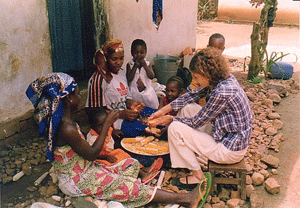
Our project welcomes established researchers from the post-doc level onwards, as well as students who work towards their undergraduate dissertations, masters or PhD theses. We also accommodate volunteers.
We are glad to host researchers, students and volunteers from a variety of backgrounds, not only because this contributes to science, but also because their presence increases the appreciation of the National Park and thus aids conservation.
Nigeria and the Field Site
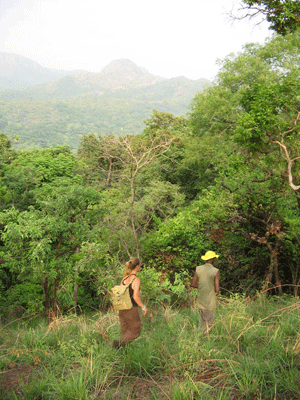
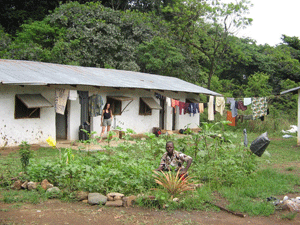
Despite its rather marred reputation, Nigeria is probably safer than other destinations favoured by travelers, be it the US, Thailand, Egypt, Indonesia, or India. Gashaka-Gumti National Park is a remote area, and not anywhere near conflicts of ethnic or political unrest sometimes featured in Western media. The most common dangers are disease (malaria, hepatitis, bilharzia, gastro-intestinal illnesses) and robberies of overland-taxis, which can be largely avoided by not traveling in the dark.
Our field site can be reached via the international airport at Nigeria's modern capital Abuja (not to be confused with Lagos!). Gashaka is 600 km (375 miles) away. The taxi trip to the nearest town of Serti takes 10-12 hours - a full day's journey. From here it is another 50 km of dirt-roads, including three river crossings, into the heart of the hilly Gashaka sector of Gashaka-Gumti National Park.
We run a research station in the village of Gashaka, and a field station in the forests of Kwano, 13 km away. At our stations, we provide double-rooms with simple beds for volunteers, students and researchers. At both stations, we self-catering kitchen facilities with gas stoves and filtered water. The project has a sizeable selection of books and DVDs.
Kwano normally has steady 24-h power-supply from our “power-island”. Gashaka just has a small solar-powered unit that can charge lap-top computers. The next e-mail facilities are hundreds of kilometres away. Letters and parcels take about 2 weeks to make it to and from Europe. Since 2010, there is mobile phone reception at the park entrance in Serti.
Volunteers
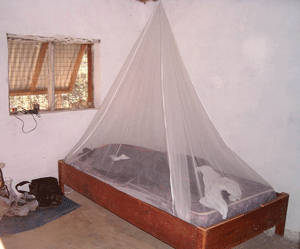
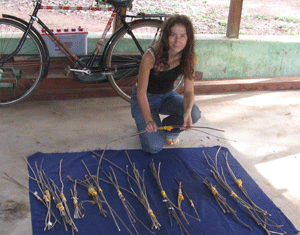
They assist researchers and students in data collection, data processing and community-related tasks. Volunteers will often accompany our local field assistants, students or researchers during their daily routines, adhering to protocols that are already worked out. Volunteers contribute to data collection, for example, about forest phenology, climate, baboon socio-ecology, chimpanzee nesting pattern, the distribution of insect nests (ants, termites, bees) in the forest, seed-dispersal, play-back experiments, ethno-botany, pattern of subsistence agriculture, non-timber forest product extraction or wildlife-surveys. Volunteering also involves data entry, data analyses, the design of flyers and information brochures, and introducing groups of Nigerian visitors (pupils, students) to the project objectives. Some volunteers have assisted in community-related projects such as mitigating human-wildlife conflict, developing a souvenir production aimed at foreign tourists, upgrading research-station facilities, marking and expanding the forest trail system or training field assistants in data collection. The exact nature of a volunteer's duty depends on which research projects are currently running.
You have to stay for a minimum of four months, and preferentially six months, as volunteers need at least the first month of their stay to learn how they can be helpful. Volunteers work five days a week. Additional days off, for example to hike in the park, might be accommodated upon request.
Students and Researchers
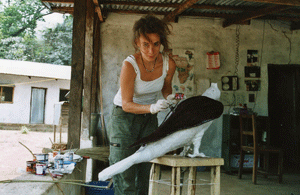

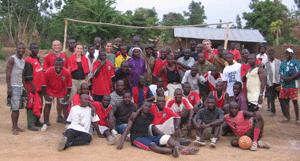
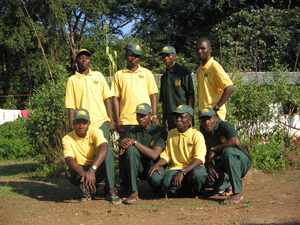
Topics of past and current research can be found in the list of publications. They are in the wider area of wildlife biology, biodiversity and conservation, and not restricted to primates.
Established researchers from the level of post-doc onwards will normally have a specific research idea. The feasibility will have to be discussed with the project management.
Students from both within Nigeria and outside Nigeria will need to identify a supervisor who takes on the responsibility for the realistic design of the thesis (undergraduate, masters, PhD) under the field conditions at Gashaka-Kwano. Current and past supervisors might be identified via the list of publications. Supervisors need to have a good working relationship and rapport of communication with the project management to enable students to conduct their field work.
Research outcomes (theses, publications) conducted at Gashaka-Kwano need to acknowledge the Gashaka Primate Project as well as the agencies that granted permits and support. Hard-copies of theses and publications have to be submitted to the project.
Costs
Unlike other projects, we do not charge a fee to volunteers, students or researchers. The following gives you an idea about costs for a trip originating in Europe:
The basic costs of a typical 5-months trip from Europe come to 1500 £ (2100 Euros):
- 500–700 £ Sterling – return flight
- 200 £ - overland travel in Nigeria
- 10–200 £ – visa (great variation: Germans 40 pounds; Italians 200 pounds; British 60 pounds)
- 100 £ – vaccinations
- 150 £ – field gear
- 60 £ per month – accommodation and use of kitchen
- 120 £ per month – food
- 120 £ per month – field assistant
- 60 £ per month – Nigeria student fund (payable by PhD students and senior researchers)
A trip of 3 months will thus cost about 2,000 £, including working with a local field assistant..
Different criteria apply to Nigerian students, for whom the project might be able to offer free stay and field assistantships at the research sites plus bursaries and assistance with university fees.
Applications
We consider applications on a rolling basis, but at least six months notice are necessary before students, researchers or volunteers can be on the ground.
Send a letter of interest to the project director Volker Sommer (v.sommer@ucl.ac.uk) with the subject heading "Volunteering at Gashaka: Your name" or "Research at Gashaka: Your name". Your letter should contain a brief CV. Do not attach electronic files as these will automatically be discarded. Instead, paste all information into the body of the message. Note, that it can sometimes take up to 8 weeks, before you might receive an initial reply.
Note, that it can sometimes take up to 8 weeks, before you might receive an initial reply. Your letter might also be passed on to a suitable partner, e.g., the baboon-project overseen by the University of Roehampton in London or the Nigeria Montane Forest Project directed out of New Zealand.
Detailed information about issues such as travel, health care, what to bring, living conditions, and various other logistic issues will be provided once candidates have been pre-selected.
Our project will assist in obtaining a visa for Nigeria and will also arrange for the permit to stay and work in the National Park, which is free of charge.
Disclaimer
Any visit to Nigeria and to the field site is conducted on your own risk. In particular, the project does not assume responsibility for issues related to health or the hazards of travel.
